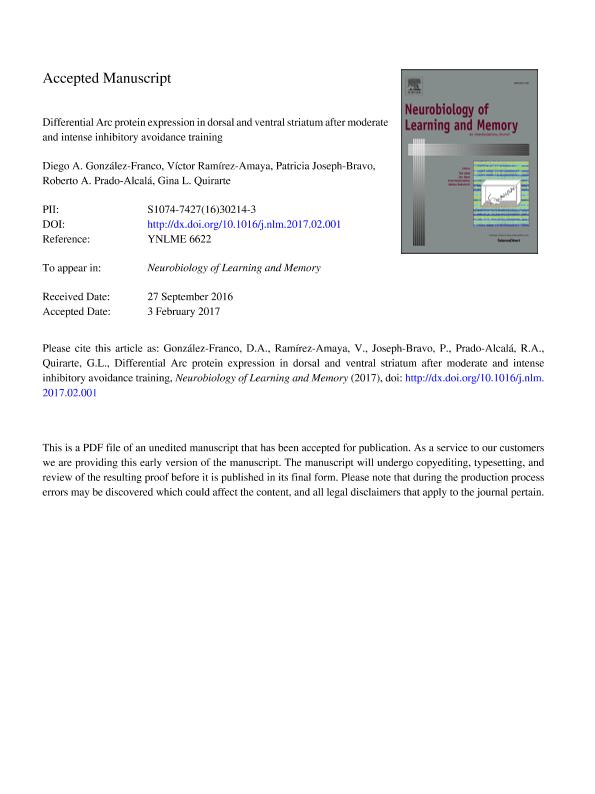Artículo
Differential Arc protein expression in dorsal and ventral striatum after moderate and intense inhibitory avoidance training
González Franco, Diego A.; Ramirez Amaya, Victor ; Joseph Bravo, Patricia; Prado Alcalá, Roberto A.; Quirarte, Gina L.
; Joseph Bravo, Patricia; Prado Alcalá, Roberto A.; Quirarte, Gina L.
 ; Joseph Bravo, Patricia; Prado Alcalá, Roberto A.; Quirarte, Gina L.
; Joseph Bravo, Patricia; Prado Alcalá, Roberto A.; Quirarte, Gina L.
Fecha de publicación:
06/04/2017
Editorial:
Academic Press Inc Elsevier Science
Revista:
Neurobiology of Learning and Memory
ISSN:
1074-7427
e-ISSN:
1095-9564
Idioma:
Inglés
Tipo de recurso:
Artículo publicado
Clasificación temática:
Resumen
Intense training refers to training mediated by emotionally arousing experiences, such as aversive conditioning motivated by relatively high intensities of foot-shock, which produces a strong memory that is highly resistant to extinction. Intense training protects memory consolidation against the amnestic effects of a wide variety of treatments, administered systemically or directly into brain structures. The mechanisms of this protective effect are unknown. To determine a potential neurobiological correlate of the protective effect of intense training, rats were trained in a one-trial step-through inhibitory avoidance task using different intensities of foot-shock (0.0, 0.5, 1.0, and 2.0 mA). Some rats from each group were sacrificed 45 min after training for immunohistochemical Arc protein detection in dorsal and ventral striatum; other rats were tested for extinction during six consecutive days, starting 48 h after training. The results showed that training with 1.0 and 2.0 mA produced optimal retention scores, which were significantly higher than those of the 0.5 and 0.0 mA groups. Also, a higher resistance to extinction was obtained with 2.0 mA than with the other intensities. A high number of neurons expressed Arc in ventral, but not in dorsal striatum in both the 1.0 and 2.0 mA groups, with a larger area of Arc signal in the latter group. We conclude that an increased Arc expression may be related to enhanced synaptic plasticity in the ventral striatum, suggesting that it may be one of the physiological substrates of enhanced learning.
Archivos asociados
Licencia
Identificadores
Colecciones
Articulos(INIMEC - CONICET)
Articulos de INSTITUTO DE INV. MEDICAS MERCEDES Y MARTIN FERREYRA
Articulos de INSTITUTO DE INV. MEDICAS MERCEDES Y MARTIN FERREYRA
Citación
González Franco, Diego A.; Ramirez Amaya, Victor; Joseph Bravo, Patricia; Prado Alcalá, Roberto A.; Quirarte, Gina L.; Differential Arc protein expression in dorsal and ventral striatum after moderate and intense inhibitory avoidance training; Academic Press Inc Elsevier Science; Neurobiology of Learning and Memory; 140; 6-4-2017; 17-26
Compartir
Altmétricas



